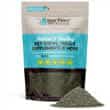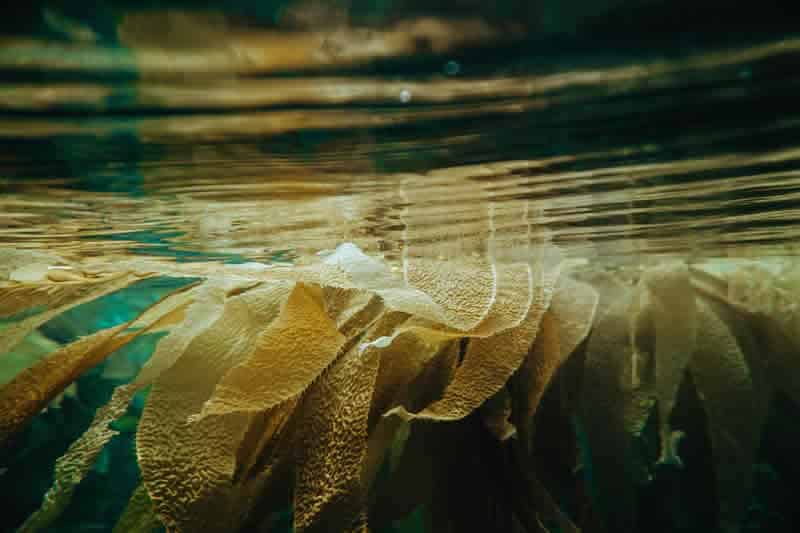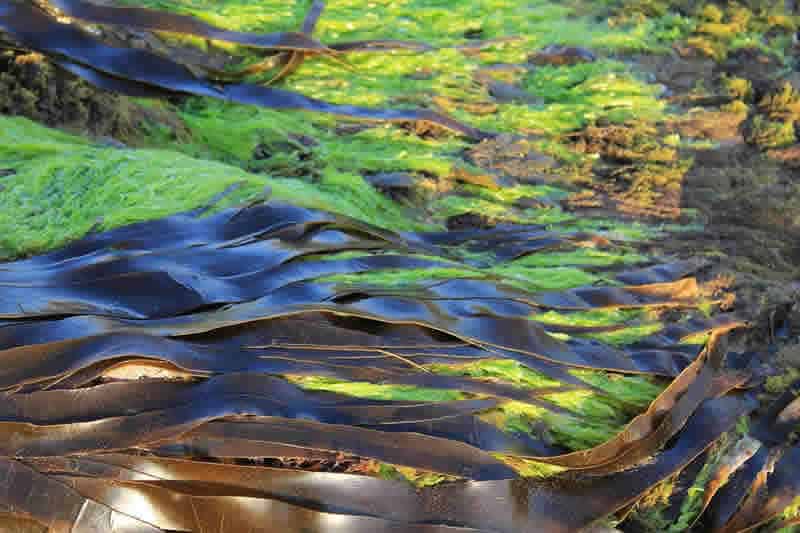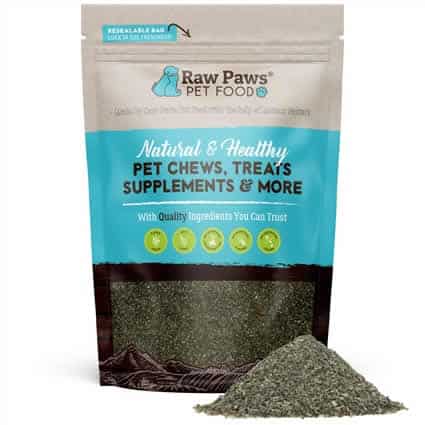There is a new superfood in town and its name is Kelp. It’s been around for thousands of years but in more recent years we are now only understanding its health benefits for humans and animals and especially our dogs.
Many users of kelp rave about how well their dogs are doing from taking kelp. The benefits range from improvements in coat, teeth and eyes, and even energy levels.
It can be added as a supplement to your dog’s food. We have reviewed the top 5 best kelp supplements available. However, it is always good practice to consult with your veterinarian before giving your dog any type of supplement.
Best Kelp Supplements Sticks for Dogs | |||
|---|---|---|---|
| Raw Paws Kelp Supplement |  | Our Rating 4.6 | |
| The Missing Link Pet Kelp Formula |  | Our Rating 4.5 | |
| Dogzymes Organic Norwegian Kelp for Pets |  | Our Rating 4.4 | |
| Thomas Labs C Kelp - Organic Kelp for Dogs |  | Our Rating 4.5 |
Best Kelp Supplements for Dogs |
|
| What is Kelp? | |
| Why is Kelp a Superfood? | |
| 7 Benefits of Kelp For Dogs | |
| The Dangers of Too Much Kelp | |
| Our Top Picks for Kelp Supplements for Dogs | |
Best Kelp Supplement for Dogs |
No 1. Raw Paws Kelp Supplement (8oz)
Raw Paws Pet Food is a family-owned American company that has sourced its kelp from some of the cleanest and richest waters in the world, around the coast of Iceland. The Raw Paws Kelp Supplement is one of the most mineral-rich supplements on the market and it does not contain any artificial ingredients. It also comes in a handy 8oz resealable bag.
Key Features
USDA Organic
All contents are 95% or more certified organic and the ingredient list on the packet is clearly shown.
GMO-Free
The genetic makeup of kelp used by Raw Paws has not been modified in a laboratory with genetic engineering.
Grain-Free
It does not contain any wheat, rice, rye, barley, or oats.
All Natural with No Preservatives
This means that the kelp is closest to its pure and natural state.
Ingredients
Certified 100% USDA Organic Icelandic Sea Kelp
Serving Suggestions
You can simply sprinkle on food and it can be fed wet or dry.
If you find that your dog will not take the kelp sprinkled over the kibble then you can soak it in water and mix it that way. Alternatively, with wet food, you can simply mix it in.
Daily Serving Size:
Dogs: 1/4 tsp for every 10 lbs
Dogs: Max. 3 tsp per day.
The Pros
USDA Organic
All Natural with no preservatives
American family-owned company
Competitively priced
The Cons
Can have a fishy smell but it is pure sea kelp.
No 2. The Missing Link Pet Kelp Formula (8oz)
The Missing Link Pet Kelp Formula is sustainably harvested off the coast of Novia Scotia. The Missing Link has been providing nutritional pet food solutions for over 20 years so they must be doing something right.
Their kelp supplement is made with a unique blend of omegas and antioxidants. All the ingredients are cold-pressed to ensure that they remain intact for better effectiveness. The Missing Link formula combines kelp with Omega 3, 6, and 9 from organic flaxseed and blueberries for additional nutritional benefits.

 Key Features
Key Features
Organic Limited Ingredients
The kelp supplement is organic and uses limited ingredients.
Made in the USA
The ingredients are harvested sustainably off the coast of Novia Scotia and manufactured in the USA
Daily Feeding Instructions
Under 9 lbs – 1/4 Tablespoon
9 to 19 lbs – 1/2 Tablespoon
20 to 49 lbs – 1 Tablespoon
50 to 89 lbs – 2 Tablespoons
More than 90 lbs – 3 Tablespoons
The Pros
Organic with limited ingredients
Added omegas from organic flaxseed & blueberries
Manufactured in the U.S.A.
The Cons
Like most kelp supplements there is a fishy smell
No 3. Dogzymes Organic Norwegian Kelp for Pets (12oz)
The Dogzymes Organic Norwegian Kelp for Pets is USDA-certified organic dried kelp. The kelp is Norwegian kelp that is provided by Nature’s Farmacy. According to the seller, it is harvested every 3 years to adhere to strict government guidelines.

Key Features
USDA Certified Organic
All contents are 95% or more certified organic and the ingredient list on the packet is clearly shown.
Daily Feeding Instructions
1 to 5 lbs – 1/4 Tablespoon
6 to 15 lbs – 1/2 Tablespoon
16 to 25 lbs – 1 Tablespoon
51 to 75 lbs – 3 Tablespoons
76 to 100 lbs – 4 Tablespoons
Over 200 lbs – Do not exceed 4 Tablespoons
Ingredients
100% Dried Organic Kelp
The Pros
USDA Certified Organic Norwegian kelp
Made in U.S.A.
Some users concerned as it contains arsenic, however, it contains organic arsenic which occurs naturally in plants & rocks & will not cause harm
The Cons
Some users found this kelp to contain some hard pieces of kelp. It is not ground into a fine powder. If this occurs it could be worth soaking the kelp serving in water beforehand.
No 4. Thomas Labs C Kelp – Organic Kelp Supplement (16oz)
Thomas Labs C Kelp – Organic Kelp Supplement for Dogs sources its kelp from the coast of Novia Scotia, Canada. It is certified organic kelp. The kelp is processed under very strict control standards to maintain its benefits. The formula used by Thomas Labs boats of a unique fiber profile that acts as a prebiotic and with antioxidant properties. It has a fine powder texture.

Key Features
USDA Organic
All contents are 95% or more certified organic and the ingredient list on the packet is clearly shown.
Daily Feeding Instructions
Dogs & Cats
Under 25 lbs – 1/4 scoop
26 – 50 lbs – 1/2 scoop
51 lbs & Over – 1 scoop
The Pros
USDA Organic
Fine powder texture
All Natural with no preservatives
The Cons
Like most kelp supplements there is a fishy smell
What is Kelp?
Kelp is a large brown algae seaweed and it is the largest plant in the seaweed family. It grows in kelp forests and can reach depths of 8 to 30 meters.
Kelp prefers to grow off rocky coasts in cool and often shallow waters with a temperature range of 43 and 57 °F (6 & 14 C). Large kelp forests can be found off the United States Pacific Northwest and off the east coast along the New England coastline. It is also grown in other parts of the world such as Iceland, Ireland, Japan, and China.
It has one of the largest amounts of trace minerals and vitamins than any other plant. The reason for this is that it does not have a root system but instead absorbs all the nutrients from the sea through the plant itself. So the more pristine and nutrient-rich the sea the more minerals and nutrients it absorbs.
Why is it a Superfood?
Kelp is classified as a superfood as it contains over sixty different types of vitamins and minerals, soluble fiber, omega-3s, and antioxidants.
Some of the main vitamins and minerals in kelp include the following:
- Vitamin A is a fat-soluble vitamin and helps your dog’s growth and immune systems. Another known benefit of this vitamin is improved eyesight.
- Vitamin K helps the blood to clot. So if your dog has a cut then it will help it clot and stop the bleed.
- Thiamine (Vitamin B1)is an essential vitamin and it must be part of your dog’s diet. It is required by the brain and other organs to function properly.
- Riboflavin (Vitamin B2) helps benefit your dog’s skin. This can be helpful for dogs with skin allergies or sensitive skin. It also helps turn fat into energy.
- Calcium is good for bones and may help prevent arthritis.
- Copper works by allowing the body to absorb iron and thereby boosting red blood cell function. It helps with the formation of dog bones and connective tissue.
- Iron is another essential mineral required by dogs to carry oxygen in red blood cells throughout the body so that energy can be produced. It is vital for certain enzymes in your dog’s body to function.
- Iodine helps with your dog’s metabolism and it is vital in supporting the adrenal pituitary and thyroid glands.
- Manganese helps dogs absorb proteins and carbohydrates. It has also been known to help slow the aging process!
- Magnesiumis a vital mineral that is required by the body. Some of the main functions include helping maintain nerve and muscle function, regulating blood glucose levels, supporting a healthy immune system, and even help keep the heart beating steady.
- Zinc is another vital mineral and helps to maintain healthy skin and coat in your dog. It also helps the thyroid and immune system function efficiently.
Source: Lucky Vitamins
7 Benefits of Kelp For Dogs
1. Helps with Healing
Sea kelp is high in protein normally around 25%, packed with amino acids, and is low in fat. As protein is vital for muscle and tissue development it helps in the healing process with the repair of damaged tissue. Adding a kelp supplement can increase your dog’s protein intake so if your dog is recovering from a recent injury or surgery it should help them recover quickly.
2. Helps Glandular System
Having a good functioning gland system is vital. Kelp contains Iodine and this plays a vital role in maintaining effective glandular function as it helps to regulate it. If your dog has a thyroid issue a deficiency in iodine could be the cause but it’s always advisable to consult with your veterinarian
Your dog needs a good functional glandular system in order to metabolize food efficiently and to maintain proper hormone levels. Adding kelp can help improve your dog’s metabolism that can lead to increased energy levels. With increased energy, it will naturally help maintain your dog’s body weight.
3. Helps Skin Allergies & Repels Fleas
Kelp has been known to help with dog skin allergies as it helps reduce itchiness. So if you have a dog who scratches a lot then it could be worth trying some kelp.
It has also been known to help improve the condition of your dog’s skin and coat. In some cases, dog owners have reported that using kelp helps keep fleas away by repelling them. Fleas can be a right pain and cause all types of discomfort for your dog and you. Treating flea infestations with harsh chemicals can sometimes have side effects so it could be worth looking at other options.
4. Improves Gut Health
Kelp is a natural source of fiber and this plays a vital role in digestive health. Cells in your dog’s colon require fiber to keep them healthy. Fiber also helps keep the digestive tract working efficiently resulting in regular bowel movements. So if you have a dog with gut issues it could be worth trying some kelp on the advice of your veterinarian.
5. Improves Dental Health
Kelp has been known to help improve canine dental health by reducing plaque and tartar buildup. There have been various studies conducted and it has been found that kelp contains a beneficial bacteria called Bacillus licheniformis. This particular bacteria has a unique enzyme that breaks down plaque and thereby helps reduce tartar buildup. Consequently, this will help with any doggie breath issues!
6. Boosts Immune System
Kelp is packed full of vitamins, minerals, amino acids, and trace elements. These all contribute to boosting your dog’s immune system resulting in a happier and healthier dog.
7. Helps Blood Circulation
Kelp also contains iron and this mineral is required for growth and development. Your dog’s body uses iron to make a protein in the blood called hemoglobin and chis carries oxygen to all parts of the body. Iron also helps fortify the blood and improve circulation.
The Dangers of Too Much Kelp
Too much of anything is never good and this can be applied to kelp. Although it is packed with multiple vitamins, minerals, and amino acids it also contains iodine.
Although iodine has some great benefits adding too much into your dog’s diet could cause some serious medical issues and lead to hypothyroidism. In layman’s terms, hypothyroidism results in the immune system attacking the thyroid gland and this can lead to all sorts of medical problems.
As we mentioned previously it is always advisable to consult your veterinarian when you start your dog on any type of supplement and this applies to kelp supplements too.
Conclusion
Our overall top pick for the best kelp supplement for dogs is the Raw Paws Kelp Supplement. This kelp supplement is one of the most mineral-rich supplements on the market and it does not contain any artificial ingredients and it also comes in a handy 8oz resealable bag. When taking any type of supplement it is always advisable to have a consultation with your veterinarian.

Sources
- https://en.wikipedia.org/wiki/Kelp
- https://www.webmd.com/diet/health-benefits-kelp#1
- https://www.banfield.com/pet-healthcare
- https://medlineplus.gov/ency/article/002423.htm
- https://www.petmd.com/blogs/nutritionnuggets/dr-coates/2015/october/what-magnesium-and-why-it-important-33238
- https://www.urmc.rochester.edu/encyclopedia/content.aspx?contenttypeid=19&contentid=Kelp
- https://www.nongmoproject.org/gmo-facts/what-is-gmo/









